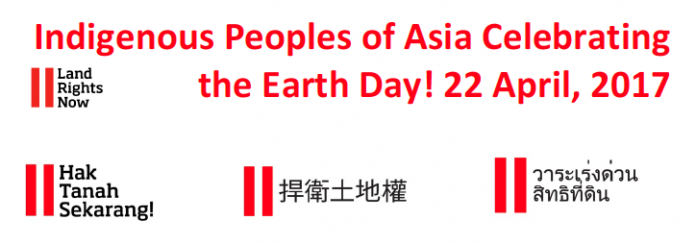Collective land rights are essential for us as indigenous peoples to enjoy our human rights and more importantly for the world to fight climate change. We, therefore, should mobilize all our communities, organizations and networks, and strengthen and expand collaboration with the supporting human rights and civil society actors to join us and take concrete actions to fight the threat of climate change by securing our land rights now!!!
“Secure Indigenous Peoples’ #landrightsnow to Combat Climate Change!”
Since the time of our ancestors, indigenous peoples across the world have been the guardians of the Mother Earth. As a collective entity, indigenous peoples play vital role and has a significant contribution to the conservation and sustainability of the biodiversity and the world’s ecosystems.
With an estimated number of more than 250 million, Asia remains the region with the highest number of indigenous population in the world. We, the indigenous peoples of Asia, are living in rainforests, wetlands, mountains and coastal areas and using the concept of collective land rights and natural resources management as the basis of our life cycle for centuries. We govern our lands, territories and resources together as biodiversity hotspots that regulate water flows, sequester carbon and maintain the ecological balance of the planet earth.
Despite our contribution and role in protecting the planet, most of our governments still do not recognize our rights to our lands, territories and resources. In Thailand, many indigenous peoples are being or can be evicted at any moment because their ancestral territories have been claimed and designated by the Thai government as national park and protected areas. Similarly, in Indonesia and Malaysia, thousands of indigenous families have been severely impacted by the massive palm oil plantation projects in the countries while indigenous peoples in coastal areas are also becoming one of the most vulnerable groups impacted by the significant change of the climate. Moreover, implementation of the laws and policies recognizing indigenous peoples’ land rights such as the Forest Rights Act in India, Land Law in Cambodia, the Indigenous Peoples Rights Act in Philippines is still profoundly questioned.
It is clear that securing indigenous peoples’ land rights is the cheapest way to combat climate change through, for example, carbon sequestration. It is also important if the world is to deliver on the promises of the Paris Agreement and keep warming under 1.5 degrees.
Collective land rights are essential for us as indigenous peoples to enjoy our human rights and more importantly for the world to fight climate change. We, therefore, should mobilize all our communities, organizations and networks, and strengthen and expand collaboration with the supporting human rights and civil society actors to join us and take concrete actions to fight the threat of climate change by securing our land rights now!!!
Source : www.aippnet.org
Objective
What we want to achieve?
- Global and national media coverage making clearer links between land rights, climate change and agro-ecology. Global visibility!
- Active involvement of important influencers in the field of land rights and climate change, including the indigenous peoples representatives across Asia region.
- Mobilization actions in at least 10 countries – marches, festivals, community meetings, direct actions based on country context.
- Participation of a diverse range of organisations from climate change, conservation, women’s rights, peace and conflict, farmer and peasant movements, etc. making links between their constituencies and secure land rights.
Organisation/s Involved
JOIN THE MOVEMENT! Contact us:
Asia Region:
www.aippnet.org
How to Support The Campaign
What can you do to participate?
- Publish press release/statement;
- Write stories on indigenous peoples’ land rights struggles;
- Link your key activities/meetings/events around the mobilization week with earth day and land rights issues;
- Conduct community visit, long march, peaceful demonstration and other forms mobilization activities;
- Organize meeting with government agencies and institutions;
- Produce pictures/videos and other campaign materials for dissemination through social media and beyond;
- Conduct traditional ceremony, art performance, etc.
We can support and provide you with:
- A narrative with facts, data and policy asks on land rights and climate change that can be used locally, nationally or internationally.
- Mobilization tools and a digital platform where actions will be highlighted.
- Support to ongoing advocacy and campaign strategies in 3 – 4 countries profiling specific cases and mobilizing global public engagement around them.
- Media contacts especially at regional and international levels.


